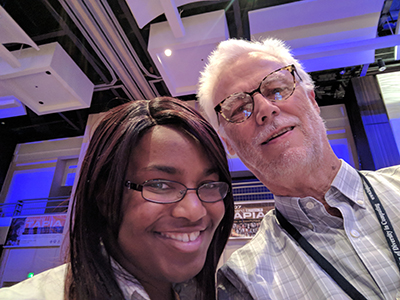The Best Aspects of Tapia
Here are some experiences from other AccessComputing team members from the 2017 ACM Richard Tapia Conference:

Kiara
I was excited to attend the career fair to get my resume to interested companies, as well as watch and participate in discussion panels such as To Disclose or not Disclose: A Question of Accommodations in the Technical Workplace. This panel was especially helpful since each time I get to each interview stage, I am always wondering how or what I can suggest to ensure that communication goes well enough during the interview. I learned how and when to ask for accommodations, and what accommodations work better in different situations.
Shareef
Tapia was great for networking, and I tried to make contact with graduate schools and big companies like Google, Microsoft, and Amazon. During the Google's DevOps (Development Operations) workshop, I got the chance to connect with Google engineers, learn more about the positions they offer, and whether I was going about the process correctly. I was happy to be able to network with them and ask questions about the interview process.
Anna
The best part of the conference was getting to meet other people with disabilities studying computer science and related disciplines. Building a sense of community is powerful. We were able to share ideas and resources. I shared my techniques for using speech-to-text tools to write up math problems with a fellow student who has difficulty with handwriting and slow typing speed. I also left the conference with a couple of open source software projects to investigate.
Attending the career fair was really beneficial to me from a professional development standpoint. Seeing that several employers were genuinely impressed with my resume gave me a confidence boost and made a career in industry seem like a real possibility. I also gathered information on lots of potential internship opportunities, had a short interview with one company, and got some feedback that I will use to fine tune my resume.
During the introductory "orientation" session, when the speaker asked for questions, I pointed out an accessibility issue that I had noticed during the presentation and asked if anything could be done about it. Though my particular concern did not get an especially satisfying response, I was proud of myself for saying something, and several students later thanked me for pointing out that there was a problem.